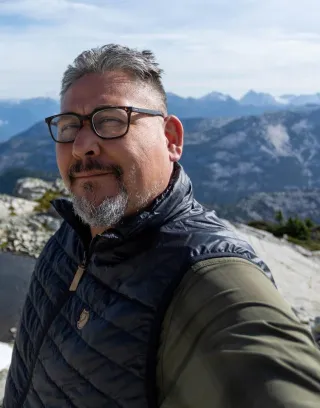
Yumks, Dr. Rudy Reimer
Biography
As a member of the Skwxwu7mesh Uxwumixw (Squamish Nation) most my research focuses on my home territory and surrounding areas of the Salish Sea. I also have broader interests on the Northwest Coast, the Plateau and western Sub-Arctic culture areas. My work focuses on bridging western science with various forms of Indigenous Knowledge. I achieve this through using geoarchaeological (lithic sources/quarries, site locations, sediments, remote sensing) and archeometric (14C dating, X-ray fluorescence, Scanning Electron Microscopy) techniques of archaeology and find links to Skwxwu7mesh
Nation/Indigenous Knowledge (oral history, toponymy, ancestry). I focus on this approach because it puts into practice the goals of Indigenous Archaeology through giving back the results of my research to the communities I work with. This makes my research relevant to academic scholars and to First Nations community members who have an interest in the past.
I also express my research interests through television media. I am the host of a currently 2 season series airing on Aboriginal Peoples Television Network (APTN) titled Wild Archaeology. This television series episodes spans across Canada and gives numerous examples of how archaeologist work in meaningful collaboration with Indigenous communities. This series one the Canadian Archaeological Association Public communications Award in 2017. I am also featured on 2 other of APTN’s series titles 1491 and Coyote Science and on the Knowledge Network on Edziza Life from Ash and Ice. I pursue these venues of disseminating knowledge as they reach a large mass of people in the effort to dispel misconceptions of Indigenous culture and history.
I am actively involved in the examination of unmarked graves in the contexts of Canadian Indian Residential Schools. Specifically, I am enmeshed in research at the residential schools at St. Pauls (North Vancouver) and St. Augustin’s (Sechelt). These are locales where my parents and ancestors were forced to attend.
My current research is focused on the long-term history of human and environmental interactions in Átl'ka7tsem (Howe Sound) under the newly designation UNESCO biosphere imitative. This research will provide data sets including ancient DNA, zooarchaeology mass spectrometry, stable isotope trophic levels, ancient environments, radiocarbon dating, and material analysis that historical and modern data sets cannot provide. For this initiative I am actively seeking graduate students with the probability of funding.